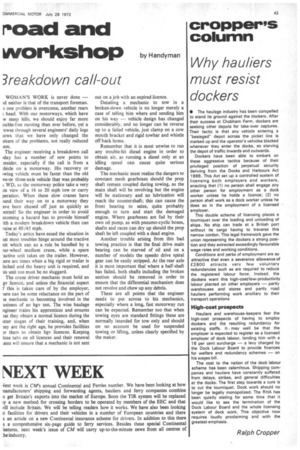cropper's column Why hauliers must resist dockers
Page 45

If you've noticed an error in this article please click here to report it so we can fix it.
• The haulage industry has been compelled to stand its ground against the dockers. After their success at Chobham Farm, dockers are seeking other depots for take-over captures. Their tactic is that any vehicle entering a "besieged" depot across the picket line is marked up and the operator's vehicles blacked whenever they enter the docks, so starving the depot of traffic inwards and outwards.
Dockers have been able to embark on these aggressive tactics because of their privileged position of perpetual security deriving from the Docks and Harbours Act 1966. This Act set up a controlled system of licensing both employers and workers, enacting that (1) no person shall engage any other person for employment as a dock worker unless he holds a licence; (2) no person shall work as a dock worker unless he does so in the employment of a licensed employer.
This double scheme of licensing places a tourniquet over the loading and unloading of ships. No ship can trade at a British port without its cargo having to traverse this narrow cordon. This legal framework gave the union representing the dockers a strong position and they extracted exceedingly favourable wage rates and working conditions.
Conditions and perks of employment are so attractive that even a severance allowance of e2800 attracts very few voluntary redundancies such as are required to reduce the registered labour force. Instead, the dockers want this high-cost/low-productivity labour planted on other employers — partly warehouses and stores and partly road hauliers performing work ancillary to their transport operations
High-cost prospects
Hauliers and warehouse-keepers fear the high-cost prospects of having to employ dockers and the resulting redundancy for existing staffs. It may well be that the employer is expected to register as a licensed employer of dock labour, landing him with a 16 per cent surcharge — a levy charged by the Dock Labour Board to provide finances for welfare and redundancy schemes — on his wages bill.
The cost to the nation of the dock labour scheme has been calamitous. Shipping companies and hauliers have constantly suffered from delays, strikes, and general difficulties at the docks. The first step towards a cure is to cut the tourniquet. Dock work should no longer be legally monopolized. The R HA has been quietly stating for some time that it would like to see the termination of the Dock Labour Board and the whole licensing system of dock work. This objective now requires loudly proclaiming and with the greatest emphasis.
Ralph Cropper




























































































